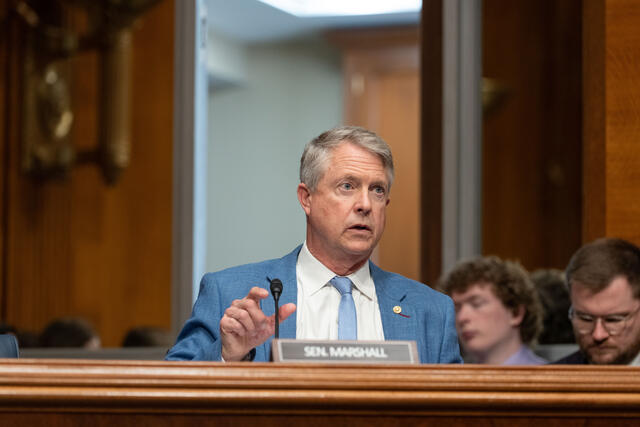Senator Marshall Questions Nominee for Deputy Secretary of Health and Human Services During HELP Committee Hearing
Washington – U.S. Senator Roger Marshall, M.D. (R-Kansas) questioned Dr. James O’Neill, the nominee for the Deputy Secretary for the Department of Health and Human Services (HHS) during the most recent Senate Committee on Health, Education, Labor and Pensions (HELP) hearing.

Click HERE or on the image above to watch Senator Marshall’s full exchange with Dr. O’Neill.
Highlights from the hearing include:
On how Dr. O’Neill will innovate at HHS:
Senator Marshall: “You mentioned in your testimony that you’re anxious to reform our food system, to prioritize health. Just kind of tell me what that vision looks like, and how can you work with Dr. Means and the other folks there at HHS.”
Dr. O’Neill: “I know that you mentioned the word mitochondria. I’ve noticed that three years ago, people didn’t know anything about that. They remember from high school biology, oh yes, mitochondria the powerhouse of the cell. But in the past few years, thanks to a lot of smart people talking about metabolism, much more than the past, people are starting to be interested.
“You know, infectious disease is still a very serious challenge to a lot of people, but metabolism, metabolic disorders, chronic diseases, are getting more attention. I think that’s wonderful. I hope they continue to get attention from researchers, from physicians, from patients.
“Regarding the food system, the unfortunate situation today is that a lot of families really try hard to be healthier and have healthier habits, and it’s not easy. They go to the grocery store, and junk food is much cheaper than healthy food. They’re not even sure which food is healthy. Nutrition labels can be confusing. Official government nutrition advice, the dietary guidelines that two departments issue every five years often seem to lag by decades.
“Actual nutrition science, real nutrition science, is so hard to do because there’s so many stakeholders with an interest in particular outcomes. I think it’s essential that we have good nutrition research that is free from outside influence.”
On the mental health problems caused by excessive technology usage:
Senator Marshall: “You also mentioned prioritize health for our children and children, and I want to just focus for a second on mental health. I’m not sure if you had the option to read the book ‘The Anxious Generation,’ but if you haven’t, surely would recommend that you do that. What role do you think social media apps have played in this, in the mental health of our children and young adults?”
Dr. O’Neill: “Thank you, Senator, that’s a great concern. So, companies that develop apps have an interest in maximizing the amount of time that users spend on the apps, the amount of engagement try to hook them into it. That’s expected, given that they’re, you know, trying to grow their business. But that’s not necessarily what’s best for users, especially young users.
“And so, there’s more and more awareness that social media can be an addiction and that it’s it especially could have a profound, lasting influence on young, developing brains. Brains seem to keep developing until age 25 so people that don’t even think of themselves as children could still be well. Adults could also suffer negatively. So yes, that is a concern that HHS should have a role in researching and communicating best practices.”
On the need for unbiased, repeatable testing:
Senator Marshall: “I just want to emphasize the importance of replicating previous studies. Again, you mentioned that in your testimony over 20 years ago. An NIH study on Alzheimer’s took us down the wrong direction, and that study was never replicated. So, what does that look like? I mean, you don’t want your best buddy to do the replication of that surgery. It needs to be another nonbiased person. So how do you implement that plan?”
Dr. O’Neill: “Absolutely. So, there’s two ways a study could lead us on the wrong road. One is outright fraud, which has happened in Alzheimer’s research. And the other is, you know, it’s kind of bad luck.
“You do one study, there was no intention of fraud, but the results, you know, were an unusual combination. The stars were in a certain alignment, and it’s also not going to replicate. So, you know, there’s a lot of talk about the replication crisis in all of science about 10 years ago, and it’s still an unsolved problem. I think NIH should devote and the problem is no one has a financial interest in replicating studies, so NIH should do that.
“And I think that would be something that NIH can do best, whether that should be conducted operationally. As one whole division of NIH focused on replication, or where there should be a replication branch in each institute, I’m open to arguments both ways.”
###
